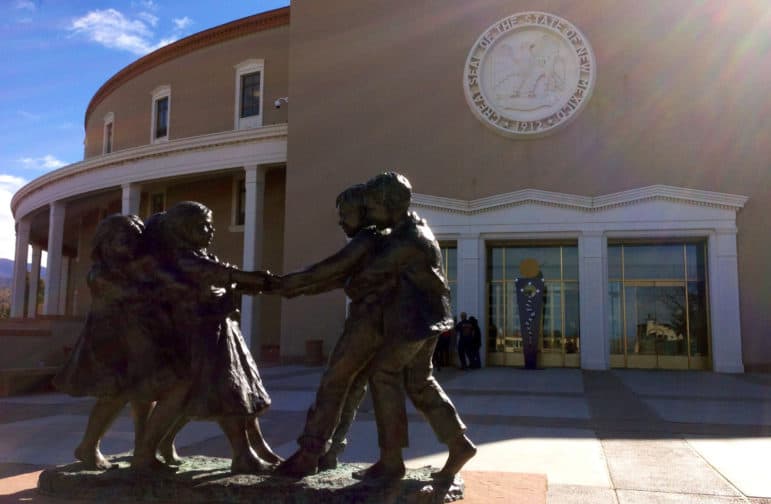
Heath Haussamen / NMPolitics.net
A statue outside the Roundhouse in Santa Fe.
New Mexico’s five electoral college votes would be awarded to the presidential candidate who received the most popular votes nationally under a bill that state senators approved Monday in a party-line decision.
All 26 Democratic senators voted for the measure and all 16 Republicans opposed it — which was perhaps a predictable outcome three months after Republican Donald Trump lost the popular vote but handily won the presidency in the electoral college.
The sponsor of the bill, Sen. Mimi Stewart, D-Albuquerque, said the electoral college allows presidential candidates to ignore most voters because it largely functions as a winner-take-all system in individual states.
“Candidates have no reason to pay attention to states where they are comfortably ahead or hopelessly behind,” Stewart said.
In addition, she said, minority-party voters in heavily Republican or overwhelmingly Democratic states believe their votes don’t matter because the electoral college takes precedence over the popular vote.
Republican senators offered a united rebuttal. They said the bill would rob New Mexico residents of power, especially because the state’s electoral college votes would go to the winner of the national popular vote, even if that candidate lost in New Mexico.
Sen. Bill Sharer, R-Farmington, said America’s founders devised the electoral college system because they didn’t want the population centers of New York, Boston and Philadelphia alone to decide who would be president. By creating the electoral college, the founders gave voice to voters in places such as rural South Carolina and the small state of Rhode Island, he said.
Sharer said America is a representative republic and criticized Stewart and other Democrats for trying to turn presidential elections into a democracy.
“I believe, with all due respect to the sponsors, that this is ignorant,” Sharer said.
Democratic senators were equally strident in supporting the bill.
“This is a very fundamental concept. One person, one vote, self-determination,” said Sen. Jeff Steinborn, D-Las Cruces.
Stewart’s proposal, Senate Bill 42, would make New Mexico part of the National Popular Vote Interstate Compact. Participating states agree to award their electoral college votes to the winner of the national popular vote. Ten states and the District of Columbia joined the compact between 2007 and 2014.
Now more states are weighing whether to join, and they include Republican strongholds where state lawmakers realize their party could someday lose the White House after winning the popular vote, Stewart said.
The agreement by states to pledge all their electoral college votes to the winner of the popular vote would take effect when enough states join to account for at least 270 electoral votes. That is the minimum number needed to elect a president. So far, Washington, D.C., and the 10 states in the compact have a total of 165 electoral votes.
Trump won last year’s election with 304 electoral college votes compared to 227 for Democrat Hillary Clinton. Trump built his margin in the electoral college by winning 30 states. Clinton took 20 states and the District of Columbia. Overall, though, Clinton received 2.6 million more popular votes than Trump.
The outcome marked the fifth time in U.S. history that a president was elected without receiving the most popular votes.
Republican state senators said Clinton bested Trump in the popular vote based on her strong showings in California, the most populous state, and New York, the fourth-largest state. Trump won easily in Texas and by a close margin in Florida, the second- and third-largest states in population, respectively.
Stewart countered that electing the president based on popular vote would be the fairest system to everyone. She cited the 2004 election as an example where Republicans could have lost the White House after their candidate decisively took the popular vote. Democrat John Kerry, the challenger, would have been elected if he had carried Ohio, even though President George W. Bush had 3 million more popular votes.
Stewart’s bill now moves to the state House of Representatives, which is also controlled by Democrats. If the bill clears the House, Republican Gov. Susana Martinez would have the final say by either signing or vetoing it. Martinez and Trump had an antagonistic relationship during the campaign season, but after Trump’s victory, Martinez said she had preferred him to Clinton.
Places that have joined the National Popular Vote Interstate Compact
- California, 55 electoral votes
- District of Columbia, three electoral votes
- Hawaii, four electoral votes
- Illinois, 20 electoral votes
- Maryland, 10 electoral votes
- Massachusetts, 11 electoral votes
- New Jersey, 14 electoral votes
- New York, 29 electoral votes
- Rhode Island, four electoral votes
- Vermont, three electoral votes
- Washington, 12 electoral votes
Contact Milan Simonich at msimonich@sfnewmexican.com or (505) 986-3080. Follow his Ringside Seat column at santafenewmexican.com.